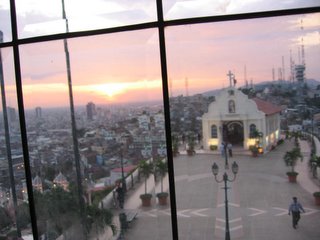
We just returned from The Galapagos Islands, where I stumbled upon insights about religion that had eluded me for a lifetime, even though they were always in plain sight. The first occurred in places I had not intended to visit, Catholic churches in Guayaquil and Quito, Ecuador. Our friends, neighbors, and traveling companions Chris and Jan Jewell invited me to attend a Mozart evening in the cathedral near our Guayaquil hotel while Alice got a massage. We made a mistake on the time, and arrived an hour early. The bottom line was we sat through Mass, which we hadn’t intended since none of us are Catholic (I'm a weak-kneed agnostic), but it did get us good seats, because before Mass was over, the cathedral was packed.
Attending Mass, besides getting us good seats for the concert, also gave me plenty of time to observe the cathedral and the worshipers. It soon dawned on me that there were major differences between Catholic and Protestant churches and services, and those differences seemed to be in the attitudes of the worshipers. What were the differences, and why were there differences?
Over a week later, after cruising, snorkeling, kayaking, and hiking The Galapagos Islands almost to exhaustion, we visited Quito for a few days. Alice wanted to visit some of the Quito cathedrals mentioned in a guide book. In one guide book, the author criticized spending money on cathedrals and parks and gardens, instead of spending it on social programs. That remark caused me much irritation, since I couldn’t see why any tourist would want to go to Ecuador to admire their social programs. In fact, as in many parts of the world, tourism is a rapidly growing source of good jobs and investment, improved environmental stewardship and conservation, and the increased economic activity eventually provides substantial funds for social programs. If you just invest in social programs, very little economic activity results and the only lasting growth is in the government bureaucracies that administer the programs and in the inevitable governmental corruption.
In Quito we visited several cathedrals, one built about 1594, another very ornate, and again I was puzzling over the impression that I was missing something. Then I realized what the something was. It was the worshipers themselves. God had been created in their image, and was accessible to them in a very personal way. Unlike the Protestant churches, with their bare crosses, there was a man suffering on this cross, and his grieving mother was nearby sharing his agony. In fact, looking around, the holy family was all about, at various stages of their lives -- Mary with baby Jesus, Jesus talking with the elders who marveled at his wisdom, Jesus driving the money changers from the temple, the crown of thorns, dragging the cross, the suffering, the suffering, the suffering – the glorious resurrection!
Here was God as man. Accessible. Suffering because he cared about the poor peasant, and the poor peasant’s family. No God did that for a poor peasant, except this one.
Allah is unknowing and uncaring. You’re here to obey him. You must obey him, because he has already decided all you will do, all you must do. No choices, no debates, no changes, no substitutions. And no pictures.
At least you could argue with the God of Moses. And argue the Jews did. It makes you feel good to know that God doesn’t always have the last word, that there is a chance you can change his mind. Still it would be nice to know him better.
But in the great Catholic cathedrals, and in the simple adobe churches, you can find Jesus Christ on a cross crucified, and his friends and family there with him, and with you, and with your family. It’s a wonderful feeling, to be a part of the family. For always, and for all time.
I think I'd sell my agnostic soul, if I had one, to have that feeling of belonging.
That peasant doesn't seem so poor after all.
No comments:
Post a Comment